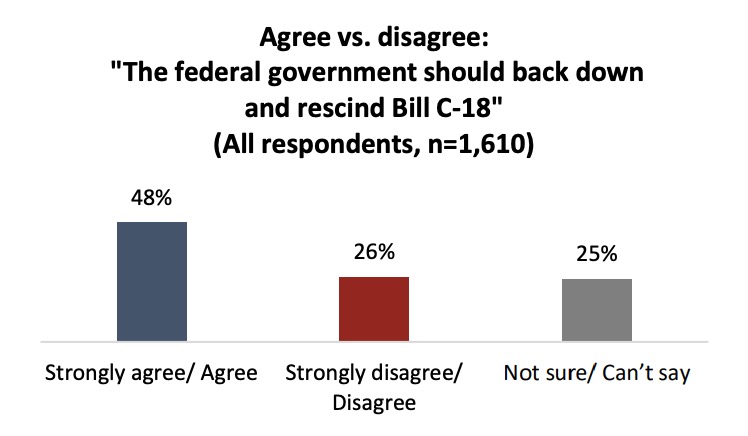
48% of Canadians Want Feds to ‘Back Down’ vs Meta and Google

The tension between the Canadian government and major tech companies over the Online News Act, also known as Bill C-18, is amplifying amidst rising temperatures this summer. The Act aims to compel tech giants such as Meta and Alphabet to invest millions into accessing and disseminating Canadian content.
A new study conducted by the non-profit Angus Reid Institute reveals that while Canadians overwhelmingly agree that big tech companies should compensate local organizations for their content, a significant portion is concerned about potential repercussions. Notably, over 60% of Canadians fear they might lose access to Canadian news on platforms like Facebook and Google.
The Angus Reid survey indicates that 61% of Canadians believe these tech giants should pay Canadian entities when their content is shared on their platforms, given the considerable advertising revenues that these platforms garner. However, the prospect of losing access to Canadian news on popular platforms like Facebook and Google is a concern for 63% of respondents.
The fear of losing these platforms as news sources has led to 48% of Canadians urging the federal government to back off from its conflict with Meta and Google. On the other hand, 26% insist that the government should stand its ground, and another 25% are unsure about the best course of action.
The potential loss of news from Facebook and Google would significantly impact Canadians, as over 40% rely on these platforms daily for news. This surpasses the usage rate for all other platforms and websites.
Other key findings from the survey include the fact that national Canadian news sites (32%), Facebook (28%), and Google News (23%) are the top go-to sources for Canadian news content.
Only around 15% of Canadians currently subscribe to a Canadian online news site. The Online News Act is more likely to be opposed by past Conservative voters (75%), while only about a third of past Liberal (32%) and NDP (34%) voters would want to reverse it.
Federal Government Seemingly Now Changing Core of Online News Act
Today Canadian Heritage outlined the next steps for the Online News Act, which seemingly suggests the government is changing the core of the Act somewhat.
That’s according to a breakdown of the complex language by University of Ottawa Professor, Michael Geist.
He says the federal government is preparing to set up regulations that will establish the minimum financial contribution from each tech giant, such as Google and Meta, in relation to their revenue derived from Canada. This sum can be met by combining both their existing deals and non-financial contributions like training programs or free advertising.
This approach appears to align with Google’s structural stipulations since it does not tie payments to hyperlinks, limits liability, and considers other forms of contributions. In practice, each company would tally up their current deals, negotiate new agreements with broadcasters and other independent outlets, and then seek exemption approval from the CRTC.
“This quagmire is entirely the government’s own making,” writes Geist. “There were alternative options proposed that look much like this structure. Those were consistently rejected and those proposing the alternatives dismissed as shills.”
“Yet faced with emerging disaster that is Bill C-18, the government seems prepared to ditch the principles it said were critical in its news bill in the hope of a face-saving compromise,” explains Geist. “Whether it is also willing to drop the visions of hundreds of millions for the sector will likely determine whether it can convince at least one of the platforms to drop their plans to block news links or news sharing in Canada,” he concluded.

